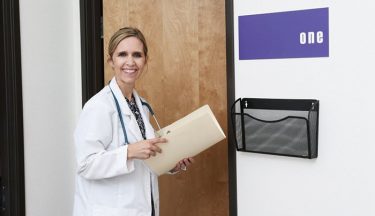By Mike Kilen
GCU News Bureau
The COVID-19 crisis has revealed remote methods of service in many areas -- and one of the most important right now is in health care.
The Canyon Health and Wellness Clinic on the campus of Grand Canyon University has responded to the challenge of limiting a virus that transmits easily from person to person by offering telehealth services, which started last weekend.

With an internet connection and a cellphone, tablet, laptop or desk computer with a camera, GCU students in Arizona can use Zoom for a virtual visit with nurse practitioners from the clinic.
Connie Colbert, Director of the Health and Wellness Clinic, said it helps limit the exposure of students and medical staff. Health care providers across the country are discouraging people from traveling to medical offices unless absolutely necessary.
She said her clinic already has been using these methods with some students who remained on campus.
“A majority of respiratory illnesses can be handled at home, even COVID, and they don’t have to come in,” she said. “Even if you have COVID and it's mild, we don’t need to test them unless they are in a situation where they need to know, such as those who are still on campus.”
The clinic has set up a special station for COVID testing on campus and quarantine procedure.
For many, a visual check-up can be just as effective.
Less severe symptoms can be assessed on Zoom, which is compliant with federal health privacy laws, including allergy or flu symptoms, coughing, fever, headaches, ear infections, rashes, nausea, diarrhea, ear infections and others. Prescription refills and mental health counseling are also available.
“It saves the person from exposure, it saves us exposure and it saves the community exposure,” she said.
Telehealth has been widely used, especially in rural areas, for many years. Health care providers can look up medical history, diagnose and treat symptoms and prescribe medication, if necessary.
“You can get a lot of information (visually),” Colbert said. “Do they look disheveled? What is their skin color? Is their skin color pale, pink or do they look gray and have eye drainage? Are they breathing hard?
“You can even see their throat from the camera. We can have them tug on their ears or push on their throat to see if it hurts, which means they might have swollen lymph nodes.”
Colbert said people are getting more comfortable with remote medicine, and it may be a method that expands after the COVID-19 crisis subsides.
The telehealth option is only available to Arizona-based students because each state has a wide range of laws governing how it can be practiced, and what nurse practitioners can treat widely varies.
However, if patients have issues that become severe, such as difficulty breathing, chest pain, signs of a stroke or suspected broken bones, they should call 911 or go to the nearest emergency room.
For an in-person visit to the GCU clinic, Colbert recommends making an appointment, which allows staff to prepare with the proper personal protective equipment (PPE). This also helps preserve the clinic's PPE reserves, which are in short supply.
HOW IT WORKS
Call 602-639-6215 or email [email protected] to schedule an appointment and answer a few questions to make sure the telehealth appointment is appropriate. Log in 10 minutes prior to the scheduled appointment.
Grand Canyon University senior writer Mike Kilen can be reached at [email protected] or at 602-639-6764.



































































